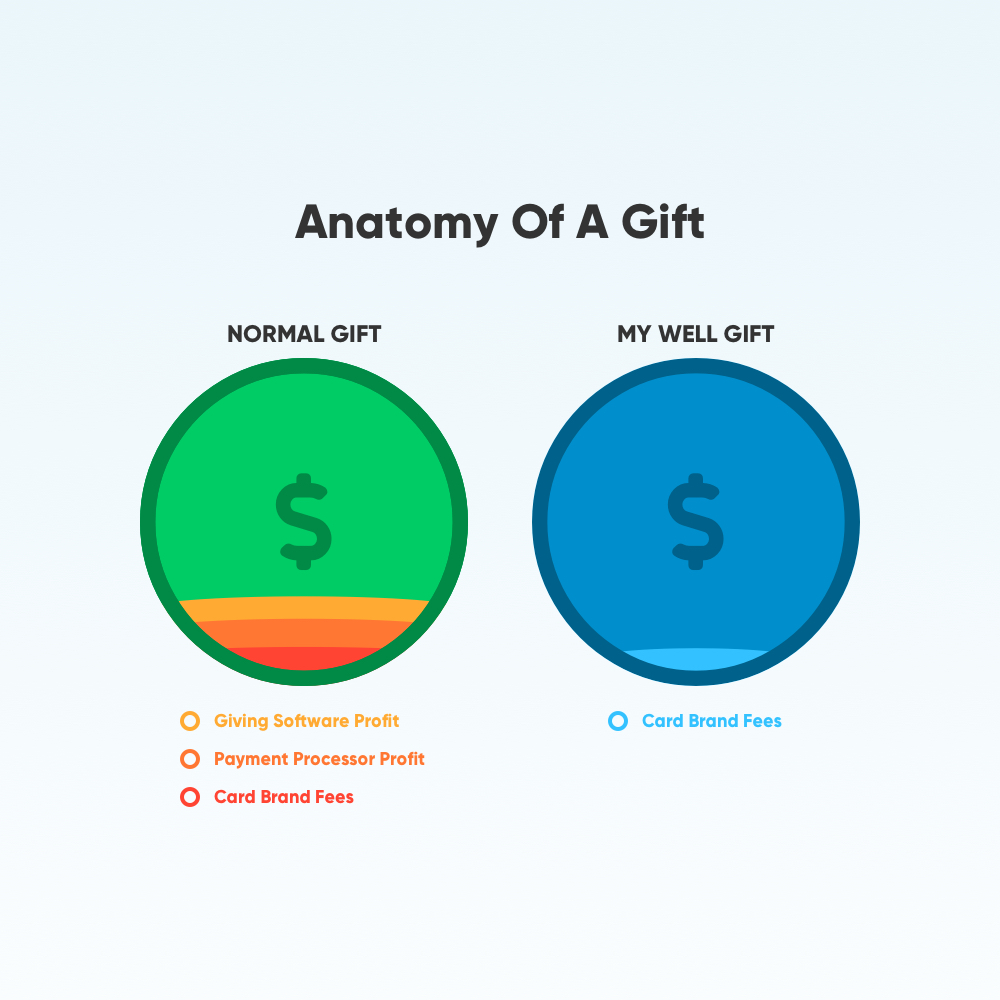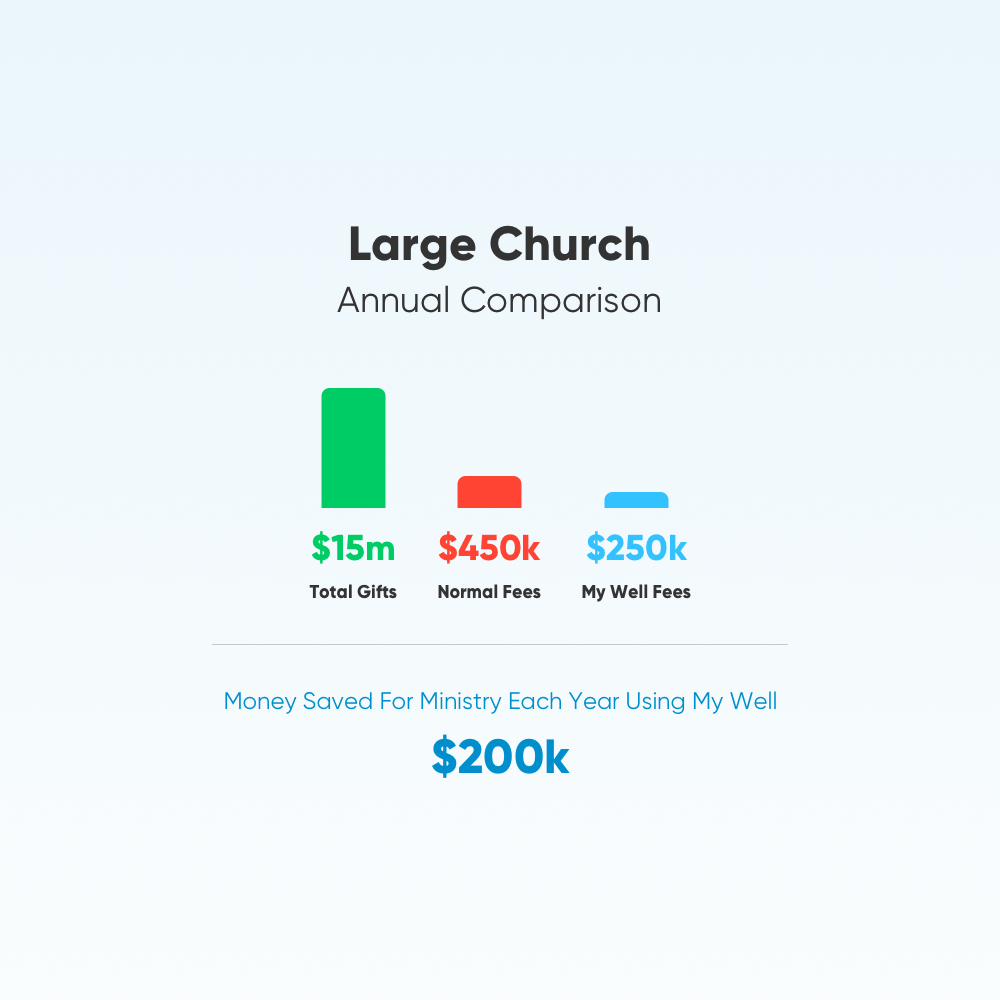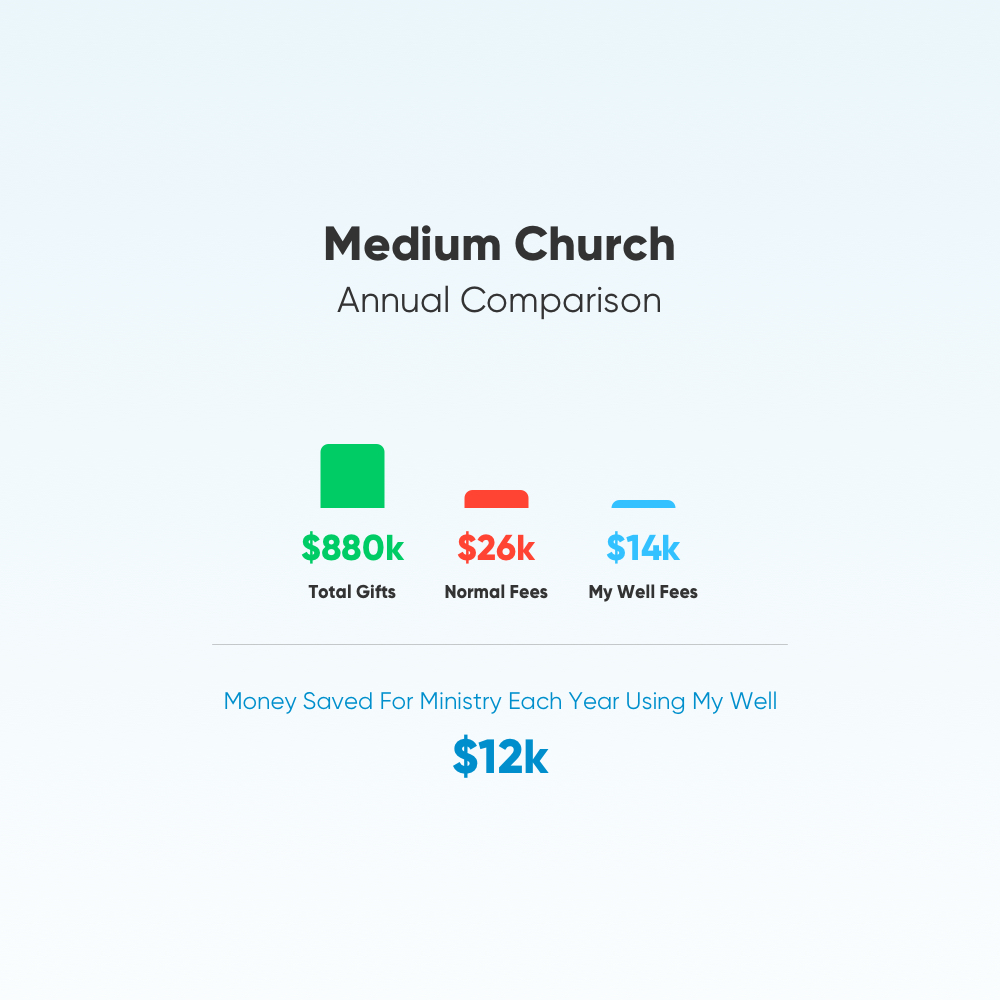
You work at a church and want to be a good steward of your finances.
You have a mission and a vision to change the world, but that vision takes money.
Every time a person makes an online donation, a payment processing company takes a 2.9% cut out of the money intended for your mission. Some say that's the cost of doing business, and while we understand that mindset—we believe it can be different.
The short answer is yes.
All companies, regardless of type or size, pay the same fees to Visa, MasterCard, Discover, & American Express when processing an online donation.
My Well Ministry is the only nonprofit online giving provider that doesn’t markup or profit from that percentage.
Industry Standard Pricing Models for Online Giving (Churches & Businesses)
As we continue, we want to equip you on the most popular pricing models in the credit card processing industry. Whether you’re a church, a nonprofit, or a for profit business, these models still apply!
1. Flat Rate Pricing
One of the most popular pricing model due to its simplicity is flat rate pricing. Kindrid, SecureGive, Stripe, PayPal, and many other online giving companies use this model. Rather than worry about the complexity of Interchange rates, church and businesses alike get charged a single rate like 2.9% + $0.30 on every transaction.
While this is certainly simple and easy to understand, most churches don't realize they're drastically overpaying for credit card pricing. With aggregate pricing, if your volume of online giving increases, your rate stays fixed, meaning that your credit & debit card processing fees will always increase proportionately as your online giving increases.
2. Tiered Pricing
At first glance, tiered pricing seems like a better option that flat rate pricing. Rather than a single flat rate, companies like Pushpay, Blue Pay and others will offer different flat rates based on several factors. For instance, a company may promote 3 different tiers—credit cards at 3%, debit cards at 2% and e-check/ACH bank account giving for 1%.
While this is better than a flat rate, your church is still significantly overpaying for credit card and e-check / ACH fees! For instance, the default rate that banks charge for ACH transactions is a whopping 0%. This means that other online giving companies are making 1% of profit on all e-check giving!
3. Interchange Plus Pricing
The most widely used and most transparent fee structure in the payment industry is Interchange Plus Pricing. There are many payment processing companies that use this model. Interchange is the collection of 400+ base fees set by the primary credit card payment networks: Visa, MasterCard, Discover, and American Express.
For example, Interchange + 100 basis points or Interchange + 30 basis points. (1 basis point equals 1/100 of a percent or .0001.) Let's say that a payment processor is charging you 2.9%. If the average effective Interchange rate is 1.75%, then you are paying 1.15% (115 basis points) in addition to the Interchange rate.
As your processed volume increases, the number of basis points you pay in addition to the base Interchange rate decreases. Using Interchange Plus Pricing is the only way you can can get the most savings as possible, by negotiating down the number of basis points added to the base Interchange rate.
Fees are applied this way whether you’re a small church of 100 people that just started processing online giving—or if you’re Amazon or Apple, processing billions of dollars each month.
Anatomy of an Online Donation

Other Online Giving Platform Pricing Models
With normal gifts given through other online giving platforms, there are fees aplenty, marking up processing costs, and skimming off the top of ACH gifts. For profit companies make their money from two things: tithes and offerings.
Each time a person gives to your church, there are three areas that take a cut of their gift before it reaches you.
- Giving Software Profit. If you’re taking donations online, you’re most likely using some form Giving Software. This could be something like a Church Management System or one of the many giving vendor you’re familiar with. This is often a form of profit for many providers.
- Payment Processor Profit. Next are the profits that go to the payment processor. This is the company that is facilitating the transfer of money from a givers bank account to your church’s bank account. They take a percentage from every gift—regardless of the pricing model they use.
- Card Brand Fees. Lastly, card brand fees are the amounts charged by all of the major card brands—Visa, MasterCard, Discover, and American Express when processing online giving.
Whether you’re a church or a multi-billion dollar company—all organizations are charged the same card brand fees.
My Well Giving Platform Pricing Model
We believe the normal model widely used with online giving for churches can and should change.
Rather than profit from tithes and offerings, we simply pass our costs on to you—eliminating any excess profits from tithes and offerings!
We believe churches should be able to accept online giving without losing cents on every dollar for others to profit on.
With My Well Ministry, you will always get Interchange Plus Zero.
Put simply, we don't profit from any of the tithes and offerings processed at your church.
The average effective rate we see across all of our organizations is 1.75%. So, if you're currently paying 2.9% for credit card processing with another company, you could instantly save 40–50% by partnering with My Well Ministry for online giving at your church.
Annual Comparison — Large Church
It's easy to look at these small percentages and breeze right past, so let's take a closer look at how it breaks down.

Say you’re a large church that currently processes $15,000,000 annually—you would pay around $450,000 each year in credit card fees. With My Well Ministry, you would only pay around $250,000 annually in credit card processing fees. That's nearly $200,000 of savings that goes back into your mission.
Don’t miss this—that results in $200,000 of tithes and offerings that are freed up for ministry.
Every.
Single.
Year.
In fact, in just 5 years, that’s 1 million dollar that this church was able to use to fund more ministry.
Annual Comparison — Medium Church

If you currently process $880,000 annually, you would pay around $26,000 each year in processing fees. With My Well Ministry, you would only pay about $14,000 annually in fees. That's nearly $12,000 of savings (nearly half of the original amount!) that goes back into your mission
Every. Single. Year.
And these numbers don't even take into account the money paid for giving software!
Conclusion
As you’ve learned today, churches can pay the exact same credit card fees that large for-profit businesses pay—the main difference is how how much profit they’re being charged. And many times, churches are being charged higher fees when it comes to online giving.
What can you do?
- Ask your current online giving provider if they offer Interchange Plus Pricing and switch to that pricing model.
- Negotiate your rate. Don’t settle for the initial rate they’ve given you. Not sure where to start? We’ll help you analyze your bill and provide a savings analysis that you can use to negotiate—no strings attached.
- Switch to My Well Ministry if you value ministry, kingdom work, and want to stop overpaying for online giving!
Now that you’re equipped with a better understanding of the credit card fees that churches pay—the next step is up to you.
How will you steward your church’s resources?









